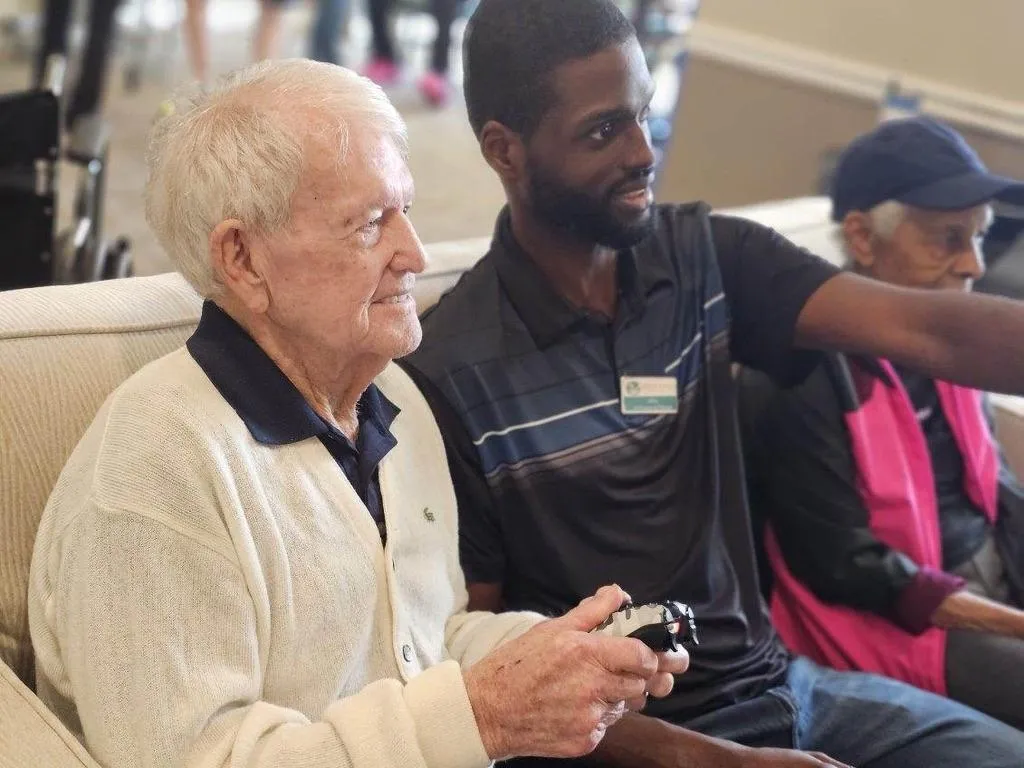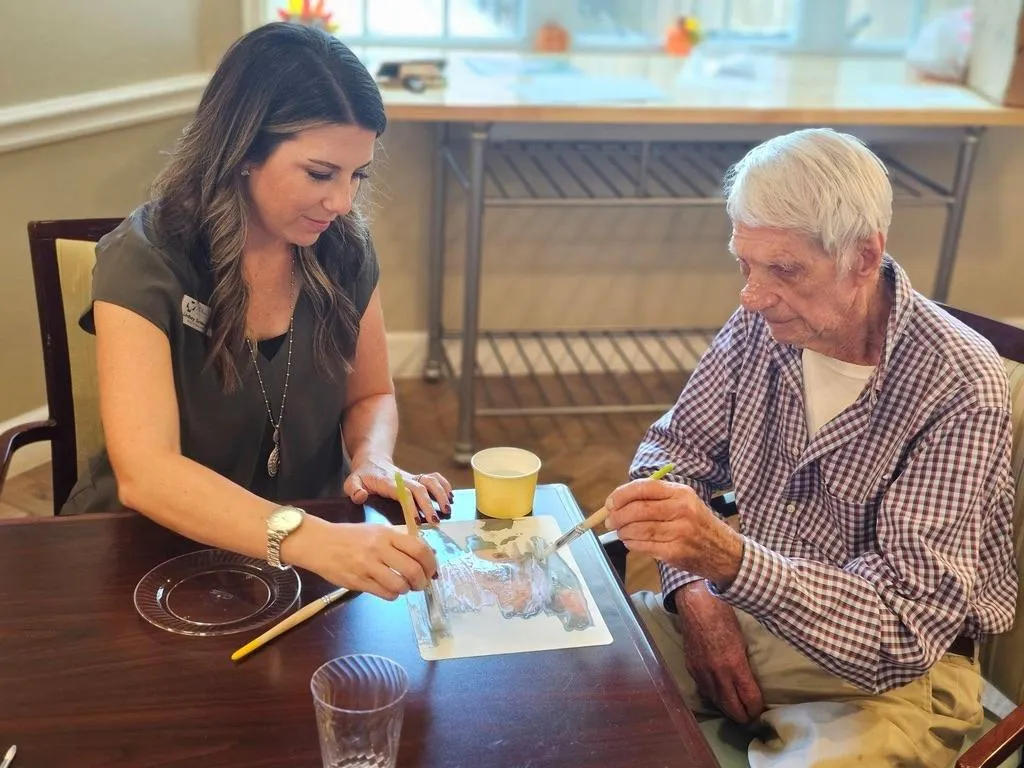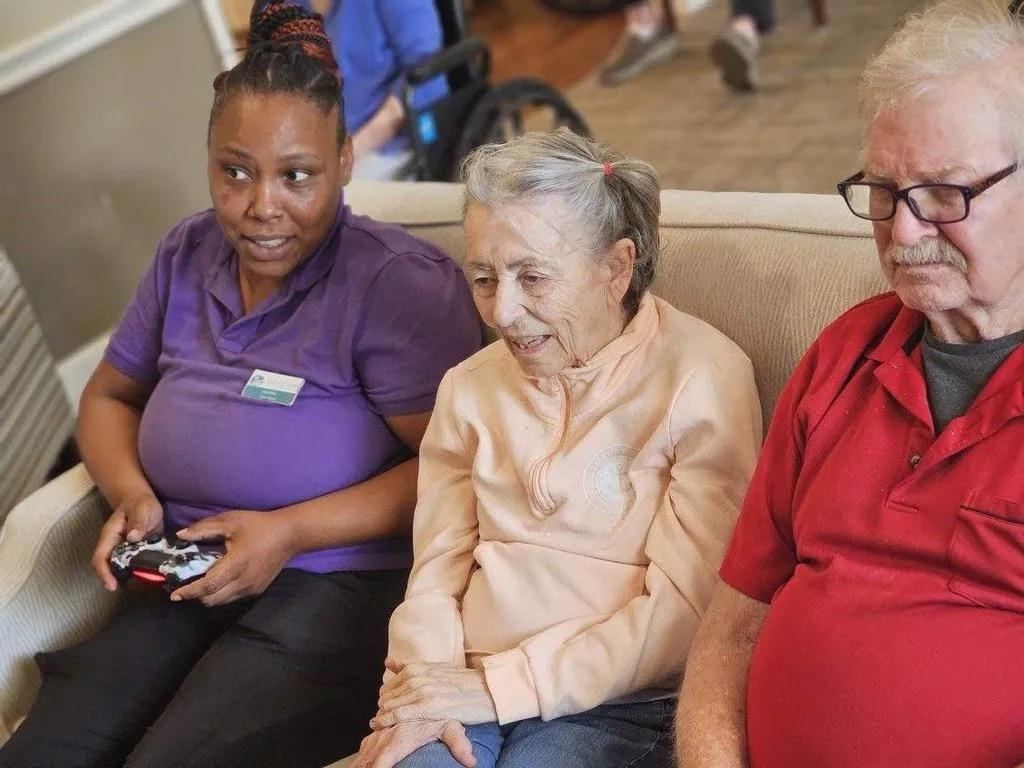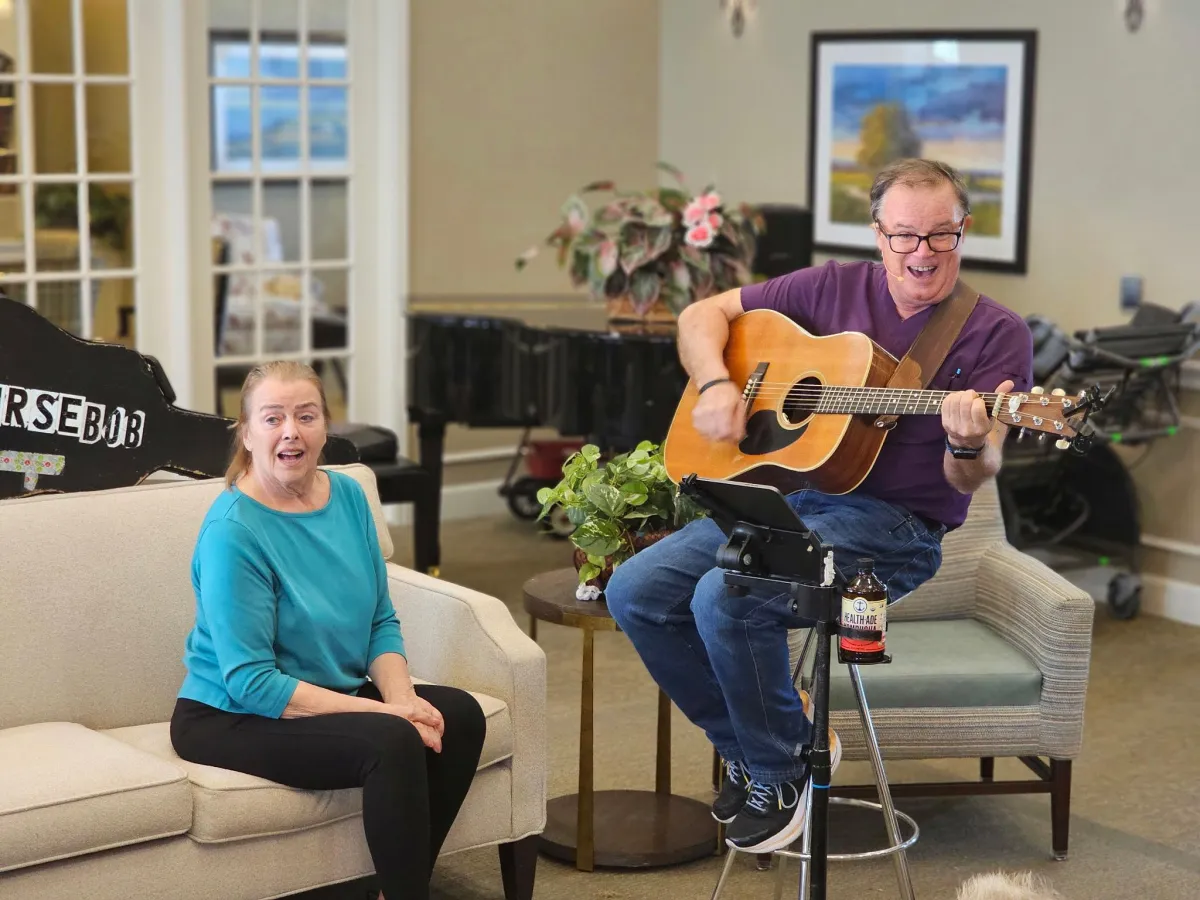Redefining Memory Care In Estero Florida
Choosing the right memory care community for a loved one is a deeply personal decision. At Gulf Coast Memory Care, nestled in the heart of Estero, Florida, we've created a haven of tranquility where residents can experience a luxurious and comfortable lifestyle. Let us help you make this important decision with confidence.
"Choose us with peace of mind; if within 90 days your heart pulls you elsewhere, we'll ensure a smooth transition and give your community fee back to help secure another place."
Your family's freedom to thrive is our top priority.

Understanding The Benefits Of Memory Care
Hear From Benita
Watch the heartfelt moment when Benita's engineer husband confidently declared, "This is the place!" It was here that Benita found the ideal environment for her mother to receive the nurturing care and robust support she truly deserved.
We believe you'll resonate with their story and feel just as confident in our ability to provide exceptional care.

Is It The Right Time For Memory Care?
Understanding that memory care is not a one-size-fits-all solution, we prioritize personalized care plans that adapt to each individual’s progression.
Learn more about senior care and get personalized results in this quick 5 minute survey.


A Community For Alzheimer’s & Dementia Care
Families seeking Alzheimer’s and dementia support in Estero, Florida, can rely on our compassionate team for a community that truly cares.
Through ongoing training in the latest memory care practices and a commitment to safety, Gulf Coast Memory Care offers peace of mind for families and the highest standard of care for residents.
Love From Our Families


My mom moved into her new home a few weeks ago. I was able to visit with her this week while being in Florida and my gosh, I know she is right where she needs to be. Huge shoutout to Jerry, Diana, Paula, Kathy and Apryl. You are real life angels. The energy you bring is above and beyond. To see how you interact with not only my mom, but all the residents, it truly warms my heart. While it is heartbreaking to see my mom battle Alzheimer's, I know she is in the perfect place. She is safe and receiving the care she needs. <3 The place is clean, accommodating and most importantly feels like home. I love that there is a schedule and many activities for the residents to participate in. My mom has loved the painting and coloring
- Bill & Bonny B


Upon entering this beautiful community, I was deeply impressed by the exceptional level of care and compassion demonstrated by all the caregivers. Every member of the team, from maintenance staff to the executive director, significantly contributes to the residents' quality of life. The interior courtyards offer a safe and beautiful outdoor escape for the residents, while the dining area is both elegant and spacious. GCMC stands out as one of the premier memory care centers I have ever visited.
- Bill & Bonny B


Exceptional dedication. Genuine care 24/7, everyone is doing a great job, from Management to the care team. Jerry and Diana are conducting the business, but you can see them walking the hallway and chatting with the residents, literally knowing everyone. There is an engine who works behind the scenes to have the day and night activity running smoothly. Family feeling, warmth, and genuine care, overall, 5 stars. Residents are never alone, there is always a pair of eyes to watch and hands ready to help as needed, but all is done in a certain way, so our loved ones don’t feel any loss of their independence. Beautifully done. The activities are not just lines on paper, everyone is involved. Food is first class.
- Bill & Bonny B
Our Senior Care Amenities

One-site beauty salon and barbershop
Personalized, chef-prepared meals
Customized activity programs
Craft and hobby room
Family living room
Full Library
Abundant natural light to minimize sundowning
Located next to Coconut Point Shopping Center

The Edison Suite

The Magnolia Suite

The Sugarberry Suite

Engaging Residents With Meaningful Social Connections
We also prioritize activities that nurture both physical and mental wellness, from gentle exercise routines to social events that create a sense of community among residents. These carefully crafted programs are designed to boost mood, reduce anxiety, and encourage meaningful interactions, all of which contribute to a fulfilling lifestyle for those facing memory challenges.
Our Commitment To You
Our commitment extends to providing families with guidance and resources to understand memory loss and navigate the journey with confidence. Whether it’s through educational workshops or one-on-one consultations, we’re here to support families every step of the way, ensuring they feel connected and informed about their loved one’s care journey.


Are You Ready To Get Settled In?
Embark on a transformative experience at Gulf Coast Memory Care in Estero, Florida. We're not just a memory care community; we're a sanctuary where the mind, body, and spirit are nurtured. If you're seeking a place where compassion, care, and a deep respect for the human soul are paramount, you've found the right haven.

How to Talk to Someone with Dementia
Communicating with someone who has dementia can feel challenging, especially as the condition progresses. Memory loss, confusion, and difficulty finding words can make conversations frustrating for both the individual and their loved ones. However, understanding the right communication techniques can help create meaningful connections while reducing stress for everyone involved.
At Gulf Coast Memory Care, we specialize in dementia care in Estero, Florida, providing compassionate support for families navigating this journey. In this guide, we’ll explore effective ways to talk to someone with dementia, the best questions to ask dementia patients, and practical strategies to make interactions more positive.
Understanding Dementia and Its Impact on Communication
Dementia affects different areas of the brain, including those responsible for language, reasoning, and memory. As a result, individuals may:
Struggle to find the right words.
Repeat themselves frequently.
Lose track of conversations.
Have difficulty understanding complex sentences.
Become frustrated or withdrawn during interactions.
Knowing what to expect allows you to adjust your communication style to make conversations more engaging and less stressful.
Best Practices for Talking to Someone with Dementia
The way you communicate can significantly impact how a person with dementia responds. Using the right approach can help them feel valued, heard, and reassured.
1. Use Simple and Clear Language
Speak slowly and clearly.
Use short sentences and simple words.
Avoid complex questions or multiple instructions at once.
Example: Instead of saying, "Do you want to go outside after lunch and maybe sit in the garden?" try "Would you like to sit outside after lunch?"
2. Maintain Eye Contact and Positive Body Language
Make sure your face is visible when speaking.
Maintain a calm and friendly facial expression.
Use gentle touch, like holding their hand, if they are comfortable with it.
3. Be Patient and Allow Time for Responses
Give them extra time to process what you’ve said.
Avoid interrupting or finishing their sentences.
If they struggle, offer a gentle prompt rather than rushing them.
4. Avoid Correcting or Arguing
If they say something incorrect, resist the urge to correct them forcefully.
Instead, validate their feelings and gently guide the conversation.
Example: If they mistake their daughter for a sister, rather than saying "No, that's not your sister!" try responding with "She loves you very much, just like your sister did."
5. Use Nonverbal Cues and Visual Aids
Pointing to objects, using gestures, or showing photos can help when words are difficult.
Pictures of family members, familiar places, or favorite objects can trigger positive responses.
Questions to Ask Dementia Patients for Meaningful Conversations
Finding the right questions to ask dementia patients can encourage positive interactions and reduce frustration. Open-ended or reminiscence-based questions are often the most effective.
Reminiscence-Based Questions (Encouraging Past Memories)
"What was your favorite childhood memory?"
"Did you have a favorite vacation spot?"
"What did you love most about your first job?"
Talking about the past can be comforting since older memories are often retained longer than recent ones.
Emotion-Focused Questions (Helping Them Express Feelings)
"How are you feeling today?"
"What makes you happy?"
"Is there anything I can do to help you feel comfortable?"
These questions show empathy and let them express emotions in a safe space.
Simple Yes-or-No Questions (Reducing Confusion)
"Would you like some tea?"
"Do you want to go for a walk?"
"Are you comfortable?"
Yes-or-no questions are easier to process and reduce frustration.
Common Communication Challenges and How to Handle Them
1. Repetitive Questions
People with dementia often repeat questions due to memory loss. Instead of getting frustrated:
Respond with patience, even if it’s the tenth time.
Use distractions by engaging them in a new activity.
Write down answers if they can still read, so they have a reference.
2. Confusion About People or Places
If they forget where they are or who someone is:
Reassure them gently without overwhelming details.
Use visual reminders like labeled family photos.
Redirect their attention to a calming activity if distress arises.
3. Agitation or Frustration
If they become upset during a conversation:
Stay calm and avoid raising your voice.
Acknowledge their emotions: “I can see you’re feeling frustrated. Let’s take a deep breath together.”
Change the environment if needed, such as playing soft music or going for a short walk.
How Gulf Coast Memory Care Supports Families
At Gulf Coast Memory Care, we understand that dementia care in Estero, Florida requires more than just medical attention, it requires compassionate communication strategies tailored to each individual.
Why Choose Us?
✔ Specialized Dementia Care – Our staff is trained in advanced communication techniques to support residents with memory loss.
✔ Personalized Care Plans – We create individualized strategies to ensure effective interactions and engagement.
✔ Family Support & Education – We provide resources to help loved ones stay connected through meaningful conversations.
If you’re struggling with communication or need expert care for a loved one, we’re here to help.
Conclusion
Communicating with a person with dementia can be challenging, but using patience, empathy, and simple strategies can improve interactions and bring comfort to both of you.
By applying the tips in this guide—such as using simple language, asking thoughtful questions, and avoiding corrections—you can create positive and meaningful conversations with your loved one.
If you need expert support, Gulf Coast Memory Care offers specialized dementia care in Estero, Florida, with a dedicated team that understands the importance of compassionate communication.
Need Expert Dementia Care? Contact Gulf Coast Memory Care Today.

How to Talk to Someone with Dementia
Communicating with someone who has dementia can feel challenging, especially as the condition progresses. Memory loss, confusion, and difficulty finding words can make conversations frustrating for both the individual and their loved ones. However, understanding the right communication techniques can help create meaningful connections while reducing stress for everyone involved.
At Gulf Coast Memory Care, we specialize in dementia care in Estero, Florida, providing compassionate support for families navigating this journey. In this guide, we’ll explore effective ways to talk to someone with dementia, the best questions to ask dementia patients, and practical strategies to make interactions more positive.
Understanding Dementia and Its Impact on Communication
Dementia affects different areas of the brain, including those responsible for language, reasoning, and memory. As a result, individuals may:
Struggle to find the right words.
Repeat themselves frequently.
Lose track of conversations.
Have difficulty understanding complex sentences.
Become frustrated or withdrawn during interactions.
Knowing what to expect allows you to adjust your communication style to make conversations more engaging and less stressful.
Best Practices for Talking to Someone with Dementia
The way you communicate can significantly impact how a person with dementia responds. Using the right approach can help them feel valued, heard, and reassured.
1. Use Simple and Clear Language
Speak slowly and clearly.
Use short sentences and simple words.
Avoid complex questions or multiple instructions at once.
Example: Instead of saying, "Do you want to go outside after lunch and maybe sit in the garden?" try "Would you like to sit outside after lunch?"
2. Maintain Eye Contact and Positive Body Language
Make sure your face is visible when speaking.
Maintain a calm and friendly facial expression.
Use gentle touch, like holding their hand, if they are comfortable with it.
3. Be Patient and Allow Time for Responses
Give them extra time to process what you’ve said.
Avoid interrupting or finishing their sentences.
If they struggle, offer a gentle prompt rather than rushing them.
4. Avoid Correcting or Arguing
If they say something incorrect, resist the urge to correct them forcefully.
Instead, validate their feelings and gently guide the conversation.
Example: If they mistake their daughter for a sister, rather than saying "No, that's not your sister!" try responding with "She loves you very much, just like your sister did."
5. Use Nonverbal Cues and Visual Aids
Pointing to objects, using gestures, or showing photos can help when words are difficult.
Pictures of family members, familiar places, or favorite objects can trigger positive responses.
Questions to Ask Dementia Patients for Meaningful Conversations
Finding the right questions to ask dementia patients can encourage positive interactions and reduce frustration. Open-ended or reminiscence-based questions are often the most effective.
Reminiscence-Based Questions (Encouraging Past Memories)
"What was your favorite childhood memory?"
"Did you have a favorite vacation spot?"
"What did you love most about your first job?"
Talking about the past can be comforting since older memories are often retained longer than recent ones.
Emotion-Focused Questions (Helping Them Express Feelings)
"How are you feeling today?"
"What makes you happy?"
"Is there anything I can do to help you feel comfortable?"
These questions show empathy and let them express emotions in a safe space.
Simple Yes-or-No Questions (Reducing Confusion)
"Would you like some tea?"
"Do you want to go for a walk?"
"Are you comfortable?"
Yes-or-no questions are easier to process and reduce frustration.
Common Communication Challenges and How to Handle Them
1. Repetitive Questions
People with dementia often repeat questions due to memory loss. Instead of getting frustrated:
Respond with patience, even if it’s the tenth time.
Use distractions by engaging them in a new activity.
Write down answers if they can still read, so they have a reference.
2. Confusion About People or Places
If they forget where they are or who someone is:
Reassure them gently without overwhelming details.
Use visual reminders like labeled family photos.
Redirect their attention to a calming activity if distress arises.
3. Agitation or Frustration
If they become upset during a conversation:
Stay calm and avoid raising your voice.
Acknowledge their emotions: “I can see you’re feeling frustrated. Let’s take a deep breath together.”
Change the environment if needed, such as playing soft music or going for a short walk.
How Gulf Coast Memory Care Supports Families
At Gulf Coast Memory Care, we understand that dementia care in Estero, Florida requires more than just medical attention, it requires compassionate communication strategies tailored to each individual.
Why Choose Us?
✔ Specialized Dementia Care – Our staff is trained in advanced communication techniques to support residents with memory loss.
✔ Personalized Care Plans – We create individualized strategies to ensure effective interactions and engagement.
✔ Family Support & Education – We provide resources to help loved ones stay connected through meaningful conversations.
If you’re struggling with communication or need expert care for a loved one, we’re here to help.
Conclusion
Communicating with a person with dementia can be challenging, but using patience, empathy, and simple strategies can improve interactions and bring comfort to both of you.
By applying the tips in this guide—such as using simple language, asking thoughtful questions, and avoiding corrections—you can create positive and meaningful conversations with your loved one.
If you need expert support, Gulf Coast Memory Care offers specialized dementia care in Estero, Florida, with a dedicated team that understands the importance of compassionate communication.
Need Expert Dementia Care? Contact Gulf Coast Memory Care Today.
Come Visit Us
We can't wait to hear from you! Fill out our contact form to get started or if you would like to see our community for yourself, schedule a tour here.
Gulf Coast Memory Care
(239) 221-6120
22900 Lyden Dr, Estero, FL 33928
AL# 12921
Privacy Policy | Accessibility Statement | Visitation Policy


